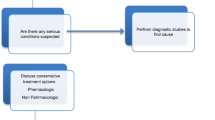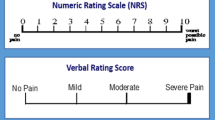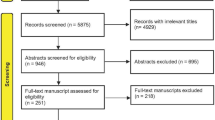Abstract
The aim of the study was to compare the effect of high-intensity laser therapy (HILT) and a combination of ultrasound (US) treatment and transcutaneous nerve stimulation (TENS) on pain, range of motion (ROM), and functional activity in patients with cervical spondylosis (CS). A total of 84 patients with a mean age of 51.54 years (52 women and 32 men) affected by CS were enrolled in this study. Patients were randomly divided into two groups. In group A (42 subjects), patients received 12 sessions of HILT plus exercise, while in group B (42 subjects), they received a combination of US, TENS, and exercise. The outcomes measured were cervical segment ROM, pain level measured by visual analogue scale (VAS), and functional activity measured by neck disability index (NDI) at the end of the therapy. The level of statistical significance was set as p < 0.05. In the two groups, cervical ROM, VAS, and functional scores showed significant changes. Both HILT plus exercise and US/TENS plus exercise effectively increased cervical ROM and reduced pain (with a significant greater decrease in group A). Statistically significant differences in NDI scores were observed after treatment sessions with better results for participants enrolled in group A (HILT plus exercise) Both therapeutic modalities demonstrated analgesic efficacy and improved function in patients affected by cervical spondylosis 4 weeks after the therapy. HILT plus exercise was more effective than US/TENS plus exercise. HILT can be promoted and used in this pathology with positive outcomes. However, further studies are needed to optimize the dose and duration of HILT therapy.


Similar content being viewed by others
References
Cherkin DC, Eisenberg D, Sherman KJ, Barlow W, Kaptchuck TJ, Street J et al (2001) Randomized trial comparing traditional Chinese medical acupuncture, therapeutic massage, and self-care education for chronic low back pain. Arch Intern Med 161(8):1081–1088
Hoving JL, Gross AR, Gasner D, Kay T, Kennedy C, Hondras MA et al (2001) A critical appraisal of review articles on the effectiveness of conservative treatment for neck pain. Spine (Phila Pa 1976) 26(2):196–205
Webb R, Brammah T, Lunt M, Urwin M, Allison T, Symmons D (2003) Prevalence and predictors of intense, chronic, and disabling neck and back pain in the UK general population. Spine (Phila Pa 1976) 28(11):1995–1202
Abbott JH, Mercer SR (2002) The natural history of acute low back pain. New Zeal J Physio 30:8–16
Day RO, Rowett D, Roughead EE (1999) Towards the safer use of non-steroidal anti-inflammatory drugs. J Qual Clin Pract 19:51–53
Kim DH, Choi JY, Kim BG et al (2016) Propesctive, randomized, and controlled trial on ketamine infusion during bilateral axillo-breast approach (BABA) robotic or endoscopic thyroidectomy: effects on postoperative pain and recovery profiles: a consort compliant article. Medicine (Baltimore) 95:e5485
Lee YH, Kim YS, Chung MJ et al (2016) Soft tissue necrosis in head and neck cancer patients after transoral robotic surgery or wide excision with primary closure followed by radiation therapy. Medicine (Baltimore) 95:e2852
Jay K, Brandt M, Jakobsen MD et al (2016) Ten weeks of physical-cognitive-mindfulness training reduces fear-avoidance beliefs about work-related activity: randomized controlled trial. Medicine (Baltimore) 95:e3945
LandenLudvigsson M, Peolsson A, Peterson G et al (2017) Cost-effectiveness of neck-specific exercise with or without a behavioral approach versus physical activity prescription in the treatment of chronic whiplash-associated disorders: analyses of a randomized clinical trial. Medicine (Baltimore) 96:e7274
Overmeer T, Peterson G, LaundenLudvigsson M et al (2016) The effect of neck-specific exercise with or without a behavioral approach on psychological factors in chronic whiplash-associated disorders: a randomized controlled trial with a 2-year follow-up. Medicine (Baltimore) 95:e4430
Yue JH, Zhang QH, Wang SL et al (2011) Research progress of electro-acupuncture treatment on cervical spondylosis radiculopathy in recent ten years. J Acupuncture Tuina Sci 2:127–132
Hedaya R (2017) Five herbs plus thiamine reduce pain and improve functional mobility in patients with pan: a pilot study. Altern Ther Health Med 23:14–19
ASA LASERGuidelines for HILT: http://www.asalaser.com/sites/default/files/documenti/terapia/catalogo_hilterapia_eng.pdf
Alayat MS, Atya AM, Ali MM, Shosha TM (2014) Long-term effect of high-intensity laser therapy in the treatment of patients with chronic low back pain: a randomized blinded placebo-controlled trial. Lasers Med Sci 29:1065–1073
Bjordal JM, Couppe C, Ljunggren AE (2001) Low level laser therapy for tendinopathy. Evidence of a dose-response pattern. PhysTher Rev 6:91–99
Dundar U, Turkmen U, Toktas H, Solak O, Ulasli AM (2015) Effect of high-intensity laser therapy in the management of myofascial pain syndrome of the trapezius: a double-blind, placebo-controlled study. Lasers Med Sci 30(1):325–332
Exelby L (1995) Mobilizations with movement: a personal view. Physiother 81(12):724–729
Mulligan BR (2010) Manual therapy: NAGS, SNAGS, MWMS etc. Wellington, N.Z.: Plane View Services Ltd
Uhl T, Carver TJ, Mattacola CG (2003) Shoulder musculature activation during upper extremity weight-bearing exercise. J Orthop Sports Phys Ther 33(3):109–117
Geraets JJ, Goossens ME, de Groot IJ, de Bruijn CP, de Bie RA, Dinant GJ, van der Heijden G, van den Heuvel WJ (2005) Effectiveness of a graded exercise therapy program for patients with chronic shoulder complaints. Aust J Physiother 51(2):87–94
Vernon H, Mior S (1991) The neck disability index: a study of reliability and validity. J Manip Physiol Ther 14(7):409–415
Fairbank JC, Couper J, Davies JB, O’Brien JP (1980) The Oswestry low back pain disability questionnaire. Physiotherapy 66(8):271–273
Vos CJ, Verhagen AP, Koes BW (2006) Reliability and responsiveness of the Dutch version of the Neck Disability Index in patients with acute neck pain in general practice. Eur Spine J 15(11):1729–1736
O’Riordan C, Clifford A, Van De Ven P, Nelson J. Chronic neckpain and exercise interventions: frequency, intensity, time, and typeprinciple. Arch Phys Med Rehabil 2014;95(4):770–783
Rudolfsson T, Djupsjöbacka M, Häger C, Björklund M (2014) Effects of neck coordination exercise on sensorimotorfunction in chronic neckpain: a randomizedcontrolled trial. J Rehabil Med 46(9):908–914
Kheshie AR, Alayat MS, Ali MM (2014) High-intensity versus low-level laser therapy in the treatment of patients with knee osteoarthritis: a randomized controlled trial. Lasers Med Sci 29:1371–1376
Karaca B (2016) Effectiveness of high-intensity laser therapy in subacromial impingement syndrome. Photomed Laser Surg 34(6):223–228
Saggini R, Bellomo RG, Cancelli F (2009) Hilterapia and chronic ankle pain syndrome - abstract from energy for health. Int J Inf Sci Cult 3:37–38
Fiore P, Panza F, Cassatella G, Russo A, Frisardi V, Solfrizzi V, Ranieri M, Di Teo L, Santamato A (2011) Short-term effects of high-intensity laser therapy versus ultrasound therapy in the treatment of low back pain: a randomized controller trial. Eur J Phys Rehabil Med 47(3):367–373
Alayat MS, Aly TH, Elsayed AE, Fadil AS (2017) Efficacy of pulsed Nd:YAG laser in the treatment of patients with knee osteoarthritis: a randomized controlled trial. Lasers Med Sci 32(3):503–511
Štiglič-Rogoznica N, Stamenković D, Frlan-Vrogč L, Avancini-Dobrović V, Schnurrer-Luke VT (2011) Analgesic effect of high intensity laser therapy in knee osteoarthritis. Coll Antropol 35:183–185
Hagiwara S, Iwasaka H, Hasegawa A, Noguchi T (2008) Pre-irradiation of blood by gallium aluminum arsenide (830 nm) low-level laser enhances peripheral endogenous opioid analgesia in rats. Anesth Analg 107(3):1058–1063
Zati A, Valent A (2006) Physical therapy: new technologies in rehabilitation medicine (translated to English). Edizioni Minerva Medica: 162–85
Samoilova KA, Zhevago NA, Petrishchev NN, Zimin AA (2008) Role of nitric oxide in the visible light-induced rapid increase of human skin microcirculation at the local and systemic levels: II. healthy volunteers. Photomed Laser Surg 26(5):443–449
Moriyama Y, Nguyen J, Akens M, Moriyama EH, Lilge L (2009) In vivo effects of low laser therapy on inducible nitric oxide synthase. Lasers Surg Med 41(3):227–231
Bjordal JM, Johnson MI, Iverson V, Aimbire F, Lopes-Martins RAB (2006) Photoradiation in acute pain: a systematic review of possible mechanism of action and clinical effects in randomized placebo controlled trials. Photomed Laser Surg 24:158–168
Wang X, Tian F, Reddy DD, Nalawade SS, Barrett DW, Gonzalez-Lima F, et al. (2017) Up-regulation of cerebral cytochrome-c-oxydase and hemodynamics by transcranial infrared laser stimulation a broadband near-infrared spectroscopy study. J Cereb Blood Flow Metab, p. 271678X17691783, Jan 01
Wang X, Tian F, Soni SS, Gonzalez-Lima F, Liu H (2016) Interplay between up-regulation of cytochrome-c-oxidase and hemoglobin oxygenation induced by near-infrared laser. Sci Rep 6:30540
Wang X, Reddy DD, Nalawade SS, Pal S, Gonzalez-Lima F, Liu H (2018) Impact of heat on metabolic and hemodynamic changes in transcranial infrared laser stimulation measured by broadband near-infrared spectroscopy. Neurophotonics 5:011004
Lim W, Lee S, Kim I, Ching M, Kim M, Lim H, Park J, Kim O, Choi H (2007) The anti-inflammatory mechanism of 635 nm light-emitting-diode irradiation compared with existing COX inhibitors. Lasers Surg Med 39:614–621
Monici M, Cialdai F, Fusi F, Romano G, Pratesi R (2009) Effects of pulsed Nd:YAG laser at molecular and cellular level. A study on the basis of Hilterapia. Energy for Health; International Journal of information and scientific culture; 3(3)
Štiglič-Rogoznica N, Stamenković D, Frlan-Vrogč L, Avancini-Dobrović V, Vrbanić TS (2011) Analgesic effect of high intensity laser therapy in knee osteoarthritis. Coll Antropol 35(suppl. 2):183–185
Alayat MS, Elsodany AM, El Fiky AA (2014) Efficacy of high and low level laser therapy in the treatment of Bell’s palsy: a randomized double blind placebo-controlled trial. Lasers Med Sci 29:335–342
Johnson MI (2014) Transcutaneous electrical nerve stimulation (TENS): research to support clinical practice. Oxford University Press, Oxford
Melzack R, Wall PD (1965) Pain mechanisms: a new theory. Science 150(699):971–979
Johnson MI (2001) Transcutaneous electrical nerve stimulation (TENS) and TENS-like devices: do they provide pain relief? Pain Rev 8:121–158
Sluka KA, Bjordal JM, Marchand S, Rakel BA (2013) What makes transcutaneous electrical nerve stimulation work? Making sense of the mixed results in the clinical literature. Phys Ther 93(10):1397–1402
Johnson M, Martinson M (2007) Efficacy of electrical nerve stimulation for chronic musculoskeletal pain: a meta-analysis of randomized controlled trials. Pain 130(1–2):157–165
Vance CG, Dailey DL, Rakel BA, Sluka KA (2014) Using TENS for pain control: the state of the evidence. Pain Manag 4(3):197–209
Johnson MI, Bjordal JM (2011) Transcutaneous electrical nerve stimulation for the management of painful conditions: focus on neuropathic pain. Expert Rev Neurother 11(5):735–753
Jin DM, Xu Y, Geng DF, Yan TB (2010) Effect of transcutaneous electrical nerve stimulation on symptomatic diabetic peripheral neuropathy: a meta-analysis of randomized controlled trials. Diabetes Res Clin Pract 89(1):10–15
Cruccu G, Aziz TZ, Garcia-Larrea L et al (2007) EFNS guidelines on neurostimulation therapy for neuropathic pain. Eur J Neurol 14(9):952–970
Author information
Authors and Affiliations
Corresponding author
Ethics declarations
Ethical approval
All procedures performed in this study were in accordance with the ethical standards of the institutional and national research committee and with the 1964 Helsinki declaration.
Informed consent
All individual participants included in the study gave spontaneously their own informed consent.
Conflict of interest
The authors declare they have no conflict of interest.
Rights and permissions
About this article
Cite this article
Venosa, M., Romanini, E., Padua, R. et al. Comparison of high-intensity laser therapy and combination of ultrasound treatment and transcutaneous nerve stimulation in patients with cervical spondylosis: a randomized controlled trial. Lasers Med Sci 34, 947–953 (2019). https://doi.org/10.1007/s10103-018-2682-7
Received:
Accepted:
Published:
Issue Date:
DOI: https://doi.org/10.1007/s10103-018-2682-7




